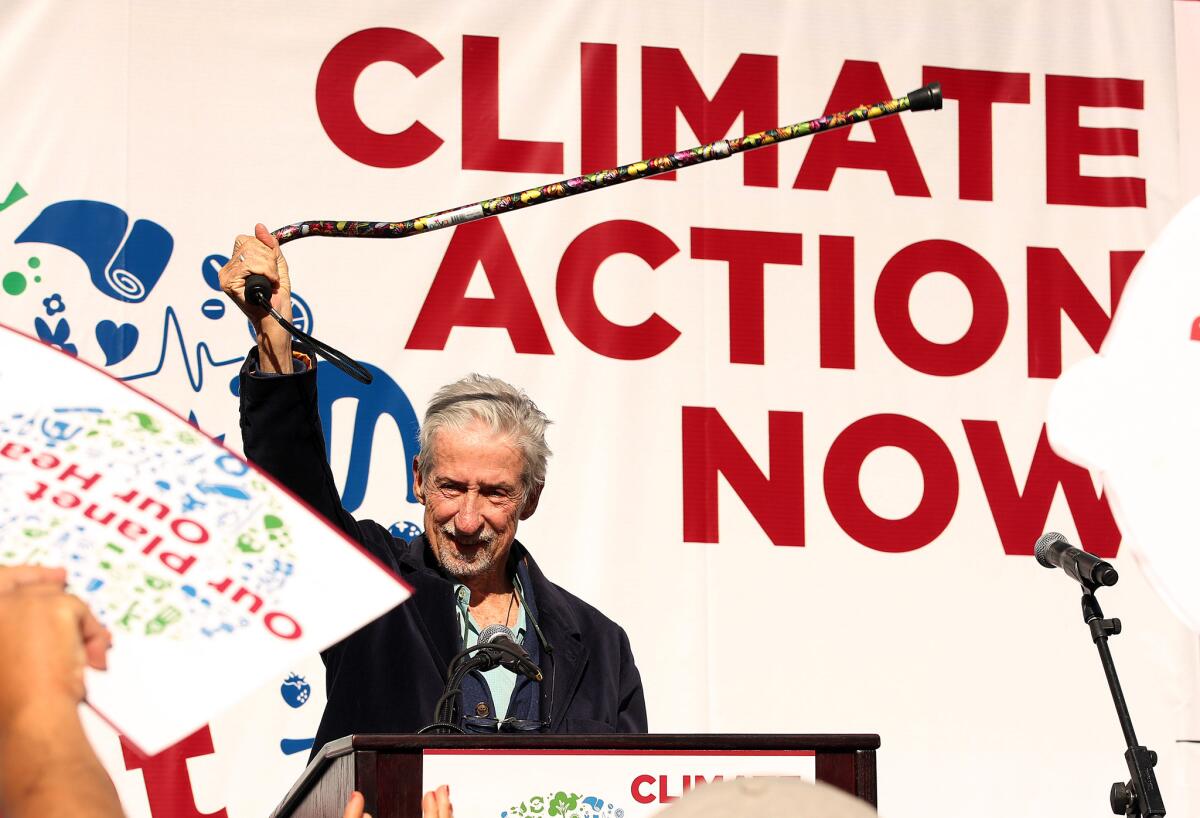Tom Hayden allies pay tribute to his dogged pursuit of liberal causes

- Share via
The day before his death, Tom Hayden was talking with his ex-wife Jane Fonda in his Santa Monica hospital room when conversation turned to a 1961 “Freedom Ride” in the Deep South, his initiation into the civil rights movement.
“He met activists who were willing to die for what they believed was right,” Fonda said Monday. “He said that it changed him forever, meeting people like that.”
Hayden’s embrace of civil disobedience in Georgia, Tennessee and Mississippi launched his career as one of America’s best-known advocates of leftist causes, most importantly as a top organizer of protests against the Vietnam War.
In the hours after he died, Hayden allies on a multitude of issues — peace in Northern Ireland and gang prevention in Los Angeles among them — paid tribute to his doggedness, while his half-century roster of adversaries kept quiet.
“If there was a struggle for equality, for climate justice, for peace, or for a stronger democracy, Tom was there and he was leading the way,” said Michael Brune, executive director of the Sierra Club. “He understood the links between these struggles and the need to approach them holistically.”
Hayden died Sunday at UCLA Medical Center in Santa Monica after a long illness. He was 76.
To the end, Hayden stayed active in politics. He ran early this year for a seat on the Democratic National Committee, but fell short.
Despite his increasingly frail health, Hayden attended the Democratic National Convention in Philadelphia in August. He also lobbied in Sacramento for legislation mandating cuts in greenhouse gas emissions. Gov. Jerry Brown, a Democrat who has worked with Hayden for decades, signed it into law last month.
“Tom took up causes that others avoided,” Brown said. “He had a real sense of the underdog and was willing to do battle no matter what the odds.”
Shortly before his death, Hayden, a prolific author, finished writing a book, “Hell No: The Forgotten Power of the Vietnam Peace Movement.” It will be published in March.
In the early 1970s, shortly after they married, Fonda and Hayden traveled the nation denouncing the Vietnam War.
“It was an honor to be at his side when we did that, because I saw up close and personal the work of a man who had spent already 10, 15 years organizing, raising consciousness, mobilizing people, and I learned so much,” Fonda said by phone from Colorado, where she is shooting a movie with Robert Redford.
“We started at the Ohio State Fair, and we spent three months traveling the country, and we did it again the following year. And shortly after, the war ended, and I think Tom had a big role to play in that,” Fonda said.
After the war ended, Hayden embraced mainstream politics. From 1982 to 2000, he represented the liberal Westside in the California Assembly and Senate.
In April, Hayden set off a ruckus among liberals with an essay in The Nation: “I Used to Support Bernie, but Then I Changed My Mind.” With the California Democratic presidential primary approaching, Hillary Clinton was fighting a stiff challenge on the left from Bernie Sanders. Clinton, Hayden argued, was stronger on racial issues.
“My life since 1960 has been committed to the causes of African Americans, the Chicano movement, the labor movement, and freedom struggles in Vietnam, Cuba and Latin America,” he wrote. “In the environmental movement I start from the premise of environmental justice for the poor and communities of color.”
Sanders supporters were furious, calling Hayden, among other things, “an establishment shill” and “liberal sellout.”
“Hayden ceased to be radical, and relevant, long, long ago,” Nation reader Marc Wutschke wrote in the comments section below the essay.
Fonda said Hayden was deeply committed to Clinton’s election. “What he wanted more than anything was to live long enough to see Hillary elected, and he kept communicating to us that he wanted to make sure she was protected from violence,” she said.
Clinton and her husband, former President Bill Clinton, said Hayden’s “eventful life in pursuit of peace and justice ran the gamut from protesting to legislating, with lots of writing and teaching along the way.
“Attacked first by the right as a dangerous radical, then by the left for his willingness to compromise, Tom always marched to the beat of his own drummer, doing what he thought at any given time would advance his lifelong goals,” they said in a joint statement.
Los Angeles Mayor Eric Garcetti remembered Hayden’s work negotiating a gang truce in Venice. John Burton, chairman of the California Democratic Party, highlighted two bills that Hayden passed as a lawmaker: One distributed tattoo-removal machines to help imprisoned youth cut their gang ties, and another authorized tax-free accounts for parents to save for their children’s college education.
“These bills didn’t get a lot of attention at the time, but they have had a far-reaching impact on young people’s futures,” said Burton, who led the state Senate when Hayden was a member.
Fonda recalled Hayden’s visit last year to a San Joaquin County fracking site to investigate the safety of the oil and gas extraction method.
“Even when he was starting to get very sick, he went to the Central Valley and went into a fracking mine, and I think it helped give him a stroke,” she said. “But he was still ready to go to places that were not necessarily safe or healthy in order to call attention to things.”
Twitter: @finneganLAT
ALSO:
‘The radical inside the system’: Tom Hayden, protester-turned-politician, dies at 76
A Republican senator’s strategy to save his seat in one of the country’s tightest races: Avoid Trump
More to Read
Get the L.A. Times Politics newsletter
Deeply reported insights into legislation, politics and policy from Sacramento, Washington and beyond. In your inbox twice per week.
You may occasionally receive promotional content from the Los Angeles Times.











